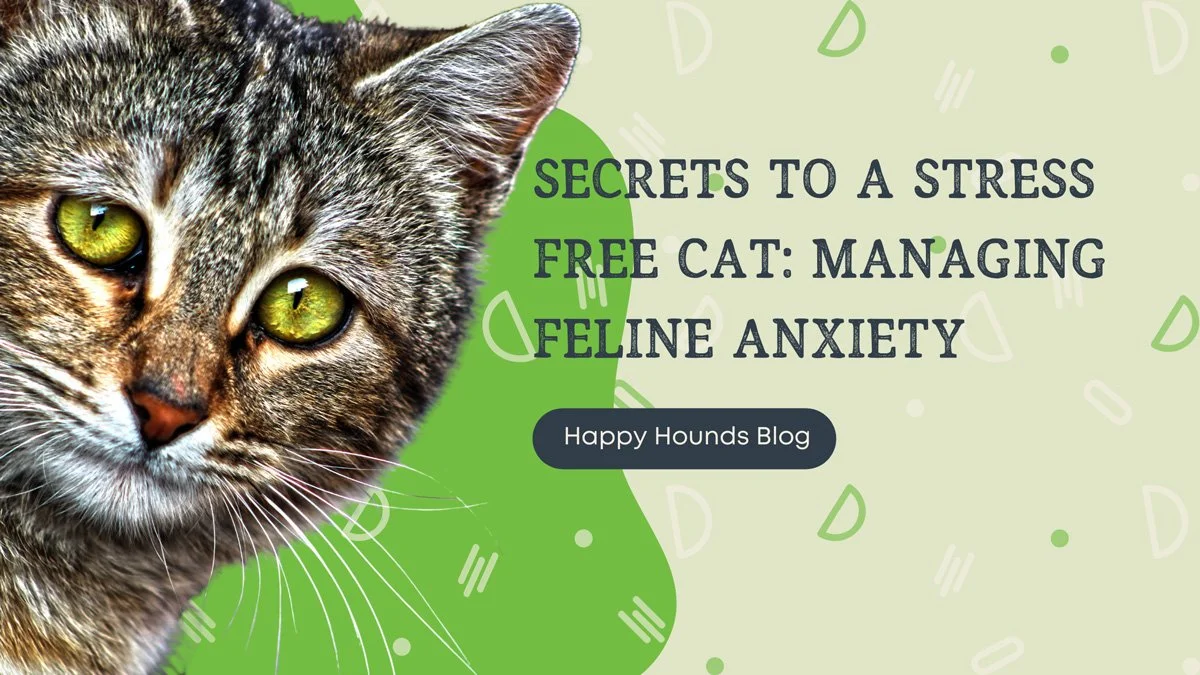Secrets to a stress-free cat: managing feline anxiety
Anxiety is a very real problem that not only causes our cats emotional distress but can also exacerbate or cause a number of medical problems, including urinary tract issues; not to mention the worry and frustration for pet parents.
Read on to learn more about the causes and symptoms of cat anxiety, and the things you can do to help support your cat to feel more secure and less anxious.
What are signs of anxiety in cats?
🐱 Hiding or avoidance behavior: If your cat is feeling anxious, they may try to hide in a secluded area or avoid interaction with people or other pets in the household.
🐱 Excessive grooming: Cats may also groom themselves excessively when they're anxious, which can lead to hair loss or skin irritation.
🐱 Aggression: Cats may become aggressive or irritable when they're feeling anxious, and may lash out at people or other pets in the household.
🐱 Changes in appetite or litter box behaviour: Cats may also experience changes in their appetite or litter box behaviour when they're anxious, and may stop eating or using the litter box regularly.
🐱 Excessive vocalisation: Some cats may meow or yowl excessively when they're anxious.
🐱 Destructive behaviour: Cats may also engage in destructive behaviour, such as scratching furniture or walls.
It’s important to note that anxiety is often a cats way of expressing that they might be feeling physical pain or a sign that they have an underlying health issue, so it is important to visit a vet to assess for any possible health issues that might be contributing to your cats anxious behaviour.
If underlying issues have been ruled out, Here are five tips that can help your cat to reduce their anxiety:
Provide a Safe Space: Cats need a place where they can retreat to when they feel anxious or stressed. Create a safe space for your cat by providing a quiet room with a comfortable bed, food, water, and a litter box. Make sure the space is away from any noise or commotion. Some cats may prefer to have a secure space that is up high where they survey the environment in safety. Other cats prefer to have a cave like environment where they can feel contained and hide from the world.
Try Pheromones: Pheromones are chemical signals that are produced by cats, used to communicate with other cats. Synthetic pheromone, like Feliway, can be used in the form of a diffuser to reduce stress and anxiety. In cats, they work by imitating the F3 facial pheromones they deposit when rubbing their face against surfaces. That means when your cat rubs her face on your leg or on furniture, he's laying claim to his territory. When he smells pheromones around the house, he is calmed because it reassures him that it’s his safe space. Pheromones will not work in every situation and for every cat, but studies* have shown that they can significantly reduce anxiety and problem behaviours in a significant percentage of cats.
Provide Enrichment: Boredom can lead to anxiety in cats, so it's essential to provide them with plenty of toys, scratching posts, and other forms of enrichment. Consider setting up a play area or cat tree for your cat to explore. Check out our blog post on enrichment for cats to give you a few ideas on spicing up your kitty’s environment.
Stick to a Routine: Cats thrive on routine and predictability. Try to stick to a regular feeding and play schedule, and avoid sudden changes to their environment or routine.
Ask your vet whether supplements, such as L-theanine would be helpful. L-theanine is an amino acid which is made primarily from green tea. It has proven benefits in people and although the research on animals is small, there is some evidence to show it can support calmness in cats. Pet Circle stocks a brand called Zylkene
Feline anxiety can be a worrying issue, but it's not insurmountable. By understanding the causes of anxiety in cats and taking steps to reduce stress, you can help your feline friend live a happy and healthy life. And if you can’t always be at home as much as you’d like, you might consider having one of our team members drop in for pop in and play visits. Pop in and play visits provide your cat with some mid-day cuddles and enrichment to ensure that your cat is in a regular routine and not lacking for companionship for long periods of time. Give us a call or text on 0422 813 742 or send us an email enquiry.



